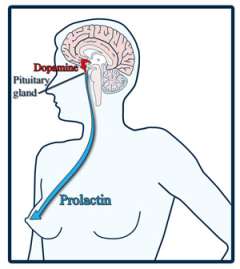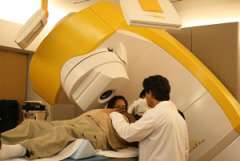Prolactinoma
Find your care
We treat pituitary tumors using the latest innovations in minimally invasive procedures. To connect with an expert in the pituitary tumor program, call 310-825-5111.
A prolactinoma is a type of pituitary tumor (adenoma) that produces an excessive amount of the hormone prolactin. Prolactinomas are the most common type of hormonally-active pituitary tumor.
Prolactinomas: expert care in Southern California

Our comprehensive approach to diagnosis and treatment of pituitary adenomas and conditions, including prolactinoma, sets the UCLA Pituitary Tumor Program apart. Our physicians treat a high volume of patients every year and perform over 100 pituitary surgeries a year, making us one of the top programs in the United States. We use the most sophisticated diagnostic equipment and offer minimally invasive surgical procedures.
Use these links to explore more about prolactinomas:

Prolactinoma: physiology
Prolactin is an important reproduction hormone. Following childbirth, prolactin levels are increased. This causes several changes:
- Prolactin and estrogen work together to produce breast milk.
- Menstrual periods stop while breastfeeding continues.
- Sexual interest (libido) decreases.
Once breastfeeding stops, prolactin levels drop back to normal and the normal menstrual cycle resumes.
In premenopausal women with a prolactinoma, the elevated prolactin level mimics these same changes, particularly the loss of menstrual cycles.
In men, the function of prolactin is less clear and may not be very important.
Prolactinomas: symptoms
Prolactinomas: Symptoms Related to High Prolactin Levels
The symptoms caused by a prolactinoma depend upon several factors, including gender and age. Prolactinomas are rare in children; when they occur, they may cause headache and weight gain.
Prolactinoma symptoms in premenopausal women:
- Small increases in prolactin cause irregular menstrual periods or complete loss of menses. Because of this noticeable symptom, prolactinomas in premenopausal women are often diagnosed early, when the tumors are small in size.
- Evidence of milk production by the breasts (galactorrhea)
- Reduced sex drive
It is unusual for a prolactinoma to progress to a large size in premenopausal women. If it does grow in size, it may cause hypopituitarism, visual losses and headache.
Prolactinoma symptoms in men and postmenopausal women:
Men and postmenopausal females do not have menstrual periods, so the effects of elevated prolactin often go unnoticed. In men particularly, prolactinomas may remain undiagnosed for years.
Symptoms in men include:
- Decreased testosterone levels, leading to low libido (sexual interest)
- Rarely enlargement of the breast tissue (gynecomastia)
- Rarely, breast milk production
Prolactinomas in men are often very large, and may invade structures adjacent to the normal pituitary gland
Prolactinomas: Symptoms Related to Large Tumor Size (Macroadenomas)
A macroadenoma is a large pituitary tumor (10 mm or larger). Large tumors can compress surrounding structures, primarily the normal pituitary gland and optic (visual) pathways, causing symptoms. The symptoms that result from the compression are independent of the effects of excess growth hormone secretion.
Often, prolactinomas in men and postmenopausal women are discovered when the tumor grows large enough to compress surrounding structures. This causes symptoms including:
-

Vision loss. This occurs when macroadenomas grow upward into the brain cavity, compressing the optic chiasm.
- A loss of the outer peripheral vision, called a bitemporal hemianopsia
- When severe, a patient can only see what is directly in front of them.
- Many patients do not become aware of their visual loss until it is quite severe.
- Other visual problems can include:
- Loss of visual acuity (blurry vision), especially if the macroadenoma grows forward and compresses an optic nerve.
- Colors not perceived as bright as usual
Pituitary failure or hypopituitarism
Increased compression of the normal gland can cause hormone insufficiency, called hypopituitarism. The symptoms depend upon which hormone is involved.
- Reduction of sex hormones, luteinizing hormone (LH) and follicle-stimulating hormone (FSH). This can be caused by direct compression of the normal gland by the tumor, but also due to inhibition of the release of these hormones when prolactin levels are elevated
- In men, this can lead to a low testosterone level, causing decreased sexual drive and impotence.
- In some cases, there can be loss of body and facial hair.
- In women, this can lead to infertility.
More severe hypopituitarism can lead to hypothyroidism or abnormally low cortisol levels, causing:
- Appetite loss
- Weight loss or gain
- Fatigue and decreased energy
- Decreased mental function
- Dizziness
- Joint pain
If severe, this can be life threatening.
Prolactinoma: other symptoms
- Headache
- Rarely, pituitary apoplexy may occur. This is when acute bleeding into the tumor occurs, causing a sudden headache, visual loss, double vision and/or pituitary failure. Immediate medical attention is usually required.
Prolactinoma: diagnosis
Your doctor will conduct a physical examination and ask you about your symptoms and medical history.
Other diagnostic procedures include:
- Hormone testing
- Imaging tests

Hormone Testing for Prolactinomas
A blood test measures the level of prolactin, which is essential for establishing a diagnosis. A very high level indicates a prolactinoma, whereas a mildly elevated level may indicate:
- A small prolactinoma
- Certain medical conditions that impair the removal of prolactin from the body
- Kidney failure
- Liver failure
- Polycystic ovarian syndrome
Certain medications and conditions may mildly elevate prolactin levels, and therefore must be considered before making the diagnosis of prolactinoma:
- Certain antipsychotic and antidepressant medications
- Estrogens
- Morphine and related narcotics
- Severe hypothyroidism
- Pregnancy
- Stress
- Breast stimulation
- The "stalk effect," a large pituitary tumor (or other tumor occurring in the same area) that causes compression of the pituitary stalk (the connection between the brain and the pituitary gland)
Learn more about hormone testing at the UCLA Pituitary Tumor Program.
Prolactinoma Diagnosis: Accuracy of Laboratory Testing
Diagnosing a prolactinoma requires special care, expertise and specialized laboratory equipment. An experienced pituitary tumor team understands the nuances of the diagnostic procedure. We will occasionally need to run extra tests and procedures if there are concerns about the results.
-

In some laboratories, very high prolactin levels can overwhelm the blood test, resulting is a falsely measured prolactin level.
- If the prolactin level is only slightly elevated, but you have a large pituitary tumor, an experienced endocrinologist will repeat the blood test using a dilution technique.
- If the test found an elevated prolactin level, but the imaging scan did not detect a tumor, we will use a special laboratory test should be ordered to measure the amount of macroprolactin.
MRI imaging for prolactinomas
Most prolactinomas can be detected using magnetic resonance imaging (MRI) of the pituitary gland. We use a special MRI pituitary protocol in order to best visualize the tumor.
Prolactinoma: treatment options
The optimal treatment of a prolactinoma depends on multiple factors, including:
- The suddenness and severity of visual loss
- Response to drug treatment
Treatment options include:

Medical Therapy for Prolactinomas
Medication is the first line of treatment for a prolactinoma. Your doctor will prescribe a medication that mimics the effects of dopamine, the brain chemical that normally inhibits the release of prolactin by the pituitary gland. The two most commonly prescribed medications are:
- Cabergoline (trade name: Dostinex) is usually the preferred medication because it is effective, has the fewest side effects and has an easy-to-manage dosage schedule of twice per week.
- Bromocriptine (trade name: Parlodel) is an older drug that is now infrequently used because it generally causes more side effects, including nausea, headache and dizziness.
About 75 percent of patients respond to medical therapy, with a noticeable reduction in tumor size:
- Most women experience a return of menses, and many become fertile again with medical therapy.
- After a year or more of therapy, about one-third of responding patients are cured with no recurrence of the tumor.
- Half of patients show show a response may require prolonged suppression therapy.
Sometimes, the tumor does not respond to medication, or you cannot tolerate the medicine, perhaps due to unwanted side effects. In this case, your doctor may recommend surgical removal of the tumor.
Optimal medical treatment of prolactinomas often requires escalation of drug dosing, and therefore endocrinologists with special training in pituitary tumor management (neuro-endocrinologist) are involved in the care.
Medical Therapy: Fertility and Pregnancy Concerns
The management of medical therapy for fertility and during pregnancy requires special consideration. It is important to discuss conception, fertility and pregnancy considerations with your endocrinologists.

Surgery for Prolactinomas
You may be a candidate for surgery if you did not respond to medical treatment. You may be a candidate if you experienced:
- Intolerable side effects of the medication
- Worsening of psychiatric symptoms
- Failure of medical treatment to effectively shrink the tumor
Most neurosurgeons specializing in pituitary tumor surgery use the minimally invasive endoscopic technique. In experienced hands, the endoscopic approach:
- Removes the tumor equally or more effectively than a traditional open approach
- Minimizes complications, hospitalization time and discomfort
This advanced technique requires specialized training and equipment and should be performed at a dedicated pituitary tumor center.

Radiation Therapy for Prolactinomas
Some tumors cannot be removed surgically, and may not respond to medications. Radiation therapy can be effective in controlling the growth of these tumors.
We use an advanced radiation therapy technique called stereotactic radiosurgery. This carefully sculpted radiation beam is able to deliver a high dose of radiation to the target. The surrounding brain structures receive only a fraction of the radiation and are typically unharmed, with the exception of the pituitary gland.
A consequence of radiation treatment is that it can cause delayed pituitary failure. This typically occurs several years after treatment. It is important that you continue your follow-up care with an endocrinologist, who can monitor your progress and any changes. You may require hormone replacement therapy.
Prolactinomas: Other Treatment Options
Rarely, prolactinoma tumors behave in a more aggressive manner that does not respond to standard medical, surgical or radiation treatment.
These tumors require a specialized multidisciplinary team approach, often incorporating the expertise of a neuro-oncologist who can administer chemotherapy agents. The UCLA Pituitary Program offers numerous clinical trials.
Contact Us
To schedule an appointment with one of our physicians at the Pituitary Tumor Program, please call (310) 825 5111.
You can also email us at [email protected]